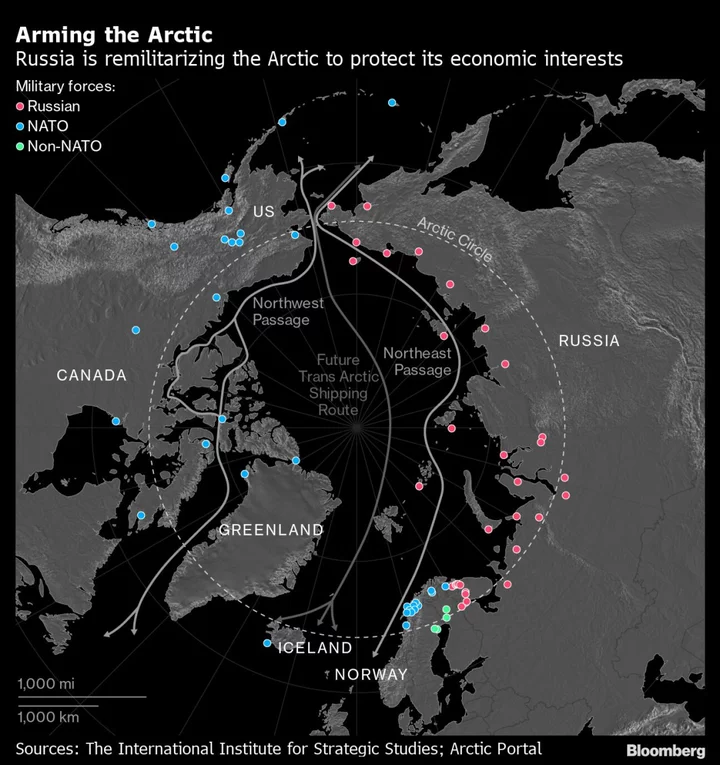Group of Seven leaders understand that the war in Ukraine may be lengthy but are prepared to support the country for as long as it takes, Canada’s prime minister said in an interview.
“We’ve always known this was going to be a long process,” Prime Minister Justin Trudeau said when asked how the Ukraine counteroffensive is progressing. “Certainly from the conversations we’ve had at the G7 and NATO, we are ready for a war that will take as long as it needs to, because we cannot and must not let Russia win.”
Trudeau made the comments during an interview about Canada’s Arctic on the sidelines of the Seventh Global Environment Facility Assembly in Vancouver.
Russia’s invasion of Ukraine has led to heightened geostrategic interest in the global Arctic. Once Sweden joins the North Atlantic Treaty Organization, Russia will be the only Arctic nation that is not a member.
Secretary General Jens Stoltenberg has stressed the need for allies to contribute at least 2% of GDP to defense. Canada isn’t meeting that goal, but has also argued that some of its security contributions, for example by its Coast Guard, aren’t counted in the calculation.
Read More: The Arctic Is Where NATO and Russia Are Flexing Military Muscle
Meanwhile, Trudeau’s government has pledged C$40 billion ($29 billion) over 20 years to upgrade Norad, the continental air defense system, and has committed to replacing aging CF-18s with F-35 fighter jets, in part because of concerns about Arctic security, Trudeau said.
“Whether it’s building more polar ice breakers, whether it’s the Arctic offshore patrol ships that we’ve just completed — these are things where we’re continuing to invest because security in the Arctic is a real challenge,” he said.
In 2005, former Prime Minister Paul Martin made clear that Canada’s Norad involvement would be limited to detection and tracking but not the interception of inbound missiles. Conversations about whether Canada should reconsider joining the US on ballistic missile defense are ongoing, Trudeau said, but noted that ICBMs are no longer the only challenge, given a new generation of hypersonic weapons that can travel at more than five times the speed of sound.
Asked if a decision on missile defense could change depending on who wins the 2024 US presidential election, Trudeau said decisions about how to contribute to North American security will remain “aligned with our values.”
“I don’t know that a change in administration would bring any massive change to what the military posture is and what the requirements are to work together,” he said. “Regardless of who is in the White House, the imperative to protect North America” will remain, as will Canada’s role in Norad.
No Nuclear Subs
Growing threats in the Arctic have fueled debate over Canada’s defense needs. Earlier this year, an alleged “spy balloon” from China was shot down over the US after entering North American airspace from the Arctic. A month later, the Canadian military found surveillance buoys in Arctic waters.
Canada needs to invest in nuclear-powered submarines in order to better patrol its vast territorial waters, retired US Navy Admiral James Stavridis argued in an Aug. 17 editorial for Bloomberg. Facing similar challenges, Australia is securing a fleet of nuclear subs from the UK and the US under the Aukus partnership to counter China’s military expansion in the Indo-Pacific.
“Canada is not in the market for nuclear submarines. There’s no question about that,” Trudeau said. “But we are already very closely collaborative within the Five Eyes, which include the three members of Aukus and the US and New Zealand. And we’re going to continue to collaborate as security partners in not just the Indo-Pacific and the Arctic and the Atlantic but everywhere around the world.”
Until recently, even as Russia became more aggressive — for example during its 2014 annexation of Crimea — its actions in the Arctic remained “constructive,” Trudeau said. But that era of Arctic exceptionalism appears to be over.
“They have not turned to a direct threat in the Arctic, but you get the sense that it is not so much because they’re holding back, just that they’re occupied elsewhere,” he said. “There doesn’t seem to be anything holding them back from being extremely negative actors on security in the Arctic now.”
Protecting Canada’s Arctic sovereignty also means helping Indigenous Northern communities thrive, Trudeau said, which means creating sustainable economic development that supports climate goals. “That’s where security, prosperity, and protection of biodiversity go together.”

